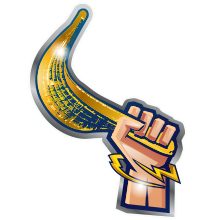

World Jai Alai League






WORLD JAI ALAI LEAGUE reserves the right to change these and any other applicable rules, bylaws, or governing documents at any time without notice.
BATTLE COURT (the “League”) is a professional jai alai league operated in Miami, Florida under the governance of the World Jai Alai League. The League offers “head-to-head” jai alai action with a team concept, a different kind of play than the parimutuel jai alai activity that had traditionally been operated.
The League shall be comprised of six (6) or more teams, known as of 2/1/24 as the Chargers, Cyclones, Devils, Fireballs, Renegades, and Warriors. Each of the teams shall be comprised of six (6) players. The League may expand the number of teams from time to time.
The teams are owned by the World Jai Alai League, and all players, coaches, referees, and other Battle Court staff are employees of the League. The League is operated and regulated by those with authority in the League Office and is subject to and governed by the Battle Court rules, bylaws, and any other governing documents created, amended, and/or promulgated by the League Office. All sponsorships, deals, seasonal ownership agreements, or other contractual relationships with third parties as between the League, teams, players, or any other employees of the League are subject to and in the sole discretion of the League Office.
Battle Court is a seasonal jai alai league that plays two 12-16 week seasons annually throughout the calendar year. The League Office determines the dates and times of play, as well as the duration of each season.
Each live play day for Battle Court will feature six (6) total matches with up to three (3) Singles matches and up to six (6) Doubles matches between the same two (2) teams.
Players in each team shall be ranked in Singles and Doubles play by the League Office in the League Office's sole discretion.
Each team will thus have five (5) Singles players ranked Division 1 through Division 5 and one additional player designated for Doubles play only. Players on each respective team shall compete against one another according to rank. Players only compete in Singles matches against equally ranked players. For example, the player ranked Division 1 on the Cyclones would play the player ranked Division 1 on the Devils, and so forth.
Each team shall form a total of six (6) Doubles pairings. As each team shall be made up of six (6) players, each player must be on two Doubles pairings. No player can be on more than two (2) Doubles pairings except due to an injury.
The team may designate the Doubles pairings as Division 1, Division 2, Division 3, Division 4, Division 5, and Division 6 subject to approval of such designations by the League Office.
Pairings designated as Division 3 and Division 4 on each team may compete against one another, and pairings designated as Division 5 and Division 6 may compete against each other. No Doubles pairing may be made of the Division 5 designated player and the designated Doubles player.
Each team will be designated as the “home” or “visiting” team in an equal number of matches. The “visiting” team will serve first in all matches.
As a general policy, substitutions must be executed by using a lower ranked player on the roster of the substituting team. Exceptions to this policy can occur: When the resulting substitution would result in the Division 5 and Division 6 designated players being paired together. In this instance the League can designate a player off the taxi squad, if available, to play in place of the “substituting” player and not the officially scheduled player.
When, as the result of a scratch in a singles match only and the Division 6 doubles player would be playing singles against a player ranked Division 5 or higher, the League, in its sole discretion, may determine the resulting match would be “non-competitive” and designate a player, if available, off the taxi squad to play in place of the Division 6 player. In such an instance points will be awarded as follows: if the non-substituting team wins, one point will be awarded and if the substituting team wins then each team will be awarded ½ point.
In the event of a match day “scratch” of a player in Singles or Doubles, only a lower ranked player (by Singles designation) or the designated Doubles player may be substituted. Substitutions can be done pre-match and in-match based on the injury occurring during play. If no lower ranked player is available, that match will be declared a forfeit.
In the event of a long-term injury (more than 14 calendar days), or an unforeseen special circumstance designated by the League office as such, a list of “Taxi Squad” players will be made available by the League Office, and a team can select from that list or elect to play under the “scratch” policy. “Taxi Squad” players will be given a Division level designation by the League and cannot play at a level lower than this designation. For example, a “Taxi Squad” player designated as Division 3 can only play at the Division 1, Division 2, or Division 3 level of play. The same holds true for a “Taxi Squad” player competing in Doubles as he can only replace a player of equal or higher Division level designation.
A player draft will be held approximately 15 to 45 days prior to the ensuing season of Battle Court.
The teams finishing last and 2nd to last in the prior season will “freeze” up to two (2) players. All other teams excluding the championship winning team will freeze up to three (3) players and the prior season’s championship team shall have the right to freeze up to four (4) players on their current roster prior to the draft. A “frozen” player will remain at their same Singles ranking for the upcoming season of Battle Court. The decision of who to freeze will be made by the team owner or, in the event no team owner exists, by the League Office. “Frozen” players must be submitted to the League Office no less than ten (10) days prior to the draft or earlier if specified by the League office.
The drafting order will be determined by the reverse order of finish in the previous season. Each round starts with the team that finished with the least amount of total points and ends with the Battle Court Champions. In the event an expansion team is added to the League, they will draft in such a position that they select one position higher in each succussive round so they end up with the 1st pick in the 6th round. With a six-team League they would draft 6th in the 1st round, 5th in the 2nd round, and so forth until selecting 1st in the 6th round. The number of players a team is allowed to freeze may be adjusted, at the discretion of the League office, prior to any season when an expansion team is being admitted into the League.
In rounds where teams have protected players, they will “forfeit” their pick in that round, and the other teams will automatically “move up” in the draft selection order.
Any players not drafted within two (2) subsequent rounds of their prior season’s Singles ranking level will automatically be placed on the “Taxi Squad” and not be eligible for draft selection until the following season. At that time, they will be open to selection in any round of the draft.
A player can only be “frozen” at his Singles ranking for three full Battle Court seasons exclusive of a Division 1 ranked player and exclusive of seasons when there is an expansion team admitted into the League. Going into the next season, if the team wants to “freeze” that same player again, the team must move the player up to a higher Singles rank. If they do not choose to move the player up in ranking, he will become eligible for selection in the ensuing draft.
Upon conclusion of the “drafting” portion of Draft Day, the owner, General Manager, and players will have approximately 75 minutes to compose their six (6) Doubles pairings and submit them for approval and announcement by the League Office. A Doubles pairing may not consist of the number five (5) and number six (6) ranked players on any team. Doubles teams will be initially submitted on draft day with one player designated as the frontcourt player and one player designated as the backcourt player. During the season a team may swap the frontcourt and backcourt players but once that swap is officially submitted to the League Office no further changes can be made for the duration of the season.
A Team Captain for each of the teams shall be appointed by the team owner, or in the event no owner exists, by the League Office at the sole discretion of the League Office. The Team Captain is the only non-player allowed in the player seating cage during a Battle Court match. When the Captain is competing in a match, one player, designated by the Captain, may take his place in the player cage.
Battle Court is played between two Singles players or two Doubles pairings. The Magic City Jai Alai Court, also known as the “cancha,” is a three-sided playing court, made of three walls – front, side (left) and back – and the floor between them. The court is 120 feet long, the length noted by parallel lines on the side wall every 10 feet, numbered from 1 through 13. Line one (1) is at the front wall side, and numbers continue to line thirteen (13) at the back wall. The service line, underserve and overserve lines are marked in red on the floor and the side wall. The out of bounds boundary line is also marked in red on the floor on the “open” side of the court, and out of bounds at the front and back walls are also designated in red. Players are required to wear a basket or “cesta” on their right hand.
Battle Court matches are composed of sets played to six points. The first player or team to win two sets is declared the winner of the match. The server is allowed two serves, specifically allowing for a second serve only if the first serve is either an underserve or an overserve. The player or team winning the point retains the serve within a set. The player or team losing the prior set is designated to serve first in the next set.
Each serve requires the player serving to bounce the ball behind the service line, then in one continuous motion, serve the ball off the front wall (the ball must strike the front wall before it comes in contact with the side wall), and the ball must land in the service box on its first bounce. The service box is designated as the space between the 4 line and the 7 line.
The object of the game is to place the ball where the opponent cannot return the ball, when caught on the fly or after one bounce, to the field of play. The ball must be caught and returned in one fluid motion. “Holding” the ball, “juggling” the ball, or anything that breaks the continuous motion, as well as failing to return the ball caught in the air or after one bounce, results in a loss of point. Interference may be ruled if, in the judge’s opinion, the location or action of a player prevented the receiving player from returning the ball and the receiving player requests interference and does not make an attempt to play the ball.
Winners of Singles matches earn one (1) point for their team. Winners of Doubles matches earn one and a half (1.5) points for their team.
The four (4) teams earning the most points during the Battle Court season will meet in the playoffs. The team earning the most points during the regular season will compete against the team earning the fourth (4th) most points during the regular season. The teams finishing with the 2nd and 3rd most points during the regular season will compete against each other in the 1st round of the playoffs. The playoff game will consist of six (6) doubles matches. The first team to win four (4) matches will be declared the winner and move on to the championship finals. If after six (6) matches the teams are tied three to three, then the higher seeded team will have pre-selected one doubles team to play a one set sudden death tiebreaker to six (6) points to determine the match winner. The championship final will follow the same format as the playoff round. The higher seeded team will always be designated as the “home” team.
In the event of a tie for positioning place during the regular season, the Team versus Team match record will determine the higher ranking of the two. If that results in a tie, then the team with the most points in head-to-head matchups will receive the higher ranking.
Players will earn prize money for each match won. Teams will earn gameday prize money based on winning or losing a gameday. There will be additional prize money based on the outcome of the playoff and championship round for all teams competing.
The Championship will consist of six (6) Doubles matches. The championship format is described above.
The team that wins the Battle Court Championship will split $30,000 and the second (2nd) place team will split $15,000.
The League Office, in its sole discretion, may enter into arrangements with third parties during each season to be named “Seasonal Owners” of each of the teams for a designated period of time. Such Seasonal Owners shall have certain rights and obligations set forth by contractual arrangement and are subject to the decisions made by the League Office and to these and any other promulgated rules, bylaws, and documents governing Battle Court. Players, coaches, referees, and any other League staff are employed solely by the League and not by any Seasonal Owner. Seasonal Owners shall not have any rights to enter into any third party or other contractual arrangements nor do they have authority to bind the League or any employee of the League.